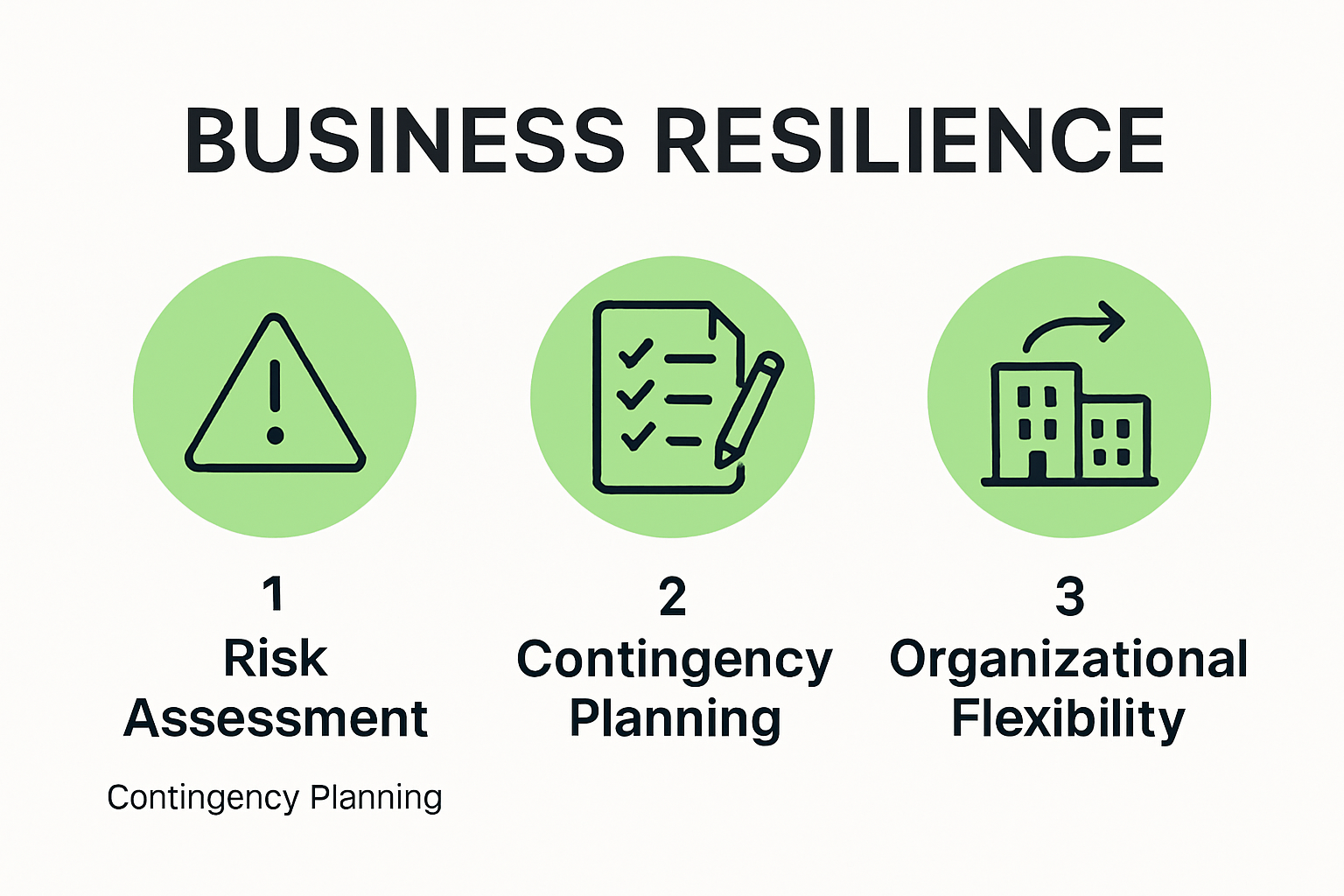
Business Resilience Strategies for Beginners 2025 Guide
Business resilience might sound complicated, but new studies show that over 40 percent of small businesses recover faster from crises when they invest in adaptable strategies and flexible systems. Sound surprising? Most people still think resilience is just about disaster planning and hoping for the best. The real edge comes from building an organization that can pivot and grow stronger every time something unexpected happens.
Table of Contents
- What Are Business Resilience Strategies?
- The Core Framework Of Business Resilience
- Strategic Implementation Approaches
- Overcoming Common Startup Challenges
- Funding And Financial Challenges
- Building A Strong Operational Foundation
- Building Flexible Systems And Mindsets
- Organizational Structure And Team Dynamics
- Developing An Adaptive Mindset
- Essential Tools For First-Time Entrepreneurs
- Strategic Planning And Research Tools
- Financial Management And Literacy
Quick Summary
What Are Business Resilience Strategies?
Business resilience strategies are systematic approaches that enable organizations to anticipate, prepare for, respond to, and adapt to unexpected challenges while maintaining core operational capabilities. These strategies go beyond traditional risk management by creating dynamic systems that can flex and recover quickly during disruptions.

The Core Framework of Business Resilience
At its foundation, business resilience involves developing comprehensive plans that protect an organization’s people, processes, and technological infrastructure. The U.S. Small Business Administration emphasizes that resilience is not just about surviving unexpected events but creating adaptive mechanisms that allow businesses to thrive under various conditions.
Key components of business resilience include:
- Risk Assessment: Systematically identifying potential threats and vulnerabilities
- Contingency Planning: Developing structured response protocols
- Organizational Flexibility: Creating systems that can quickly pivot and adapt
To help clarify the core elements of business resilience, the table below summarizes these foundational components and their main focus as discussed above.
Strategic Implementation Approaches
MIT Sloan Executive Education highlights that building organizational resilience requires a multifaceted approach. This involves creating robust processes through systems thinking and continuous improvement. Successful strategies typically integrate:
- Structured decision-making processes
- Technology integration with human adaptability
- Cultural mechanisms that support rapid transformation
Effective business resilience strategies recognize that modern challenges are complex and interconnected. They move beyond traditional linear planning models to embrace more dynamic, responsive frameworks. This means developing organizational capabilities that can rapidly assess situations, make informed decisions, and implement adaptive responses.
Business continuity planning plays a critical role in this approach. According to business continuity research, these plans outline specific scenarios and detailed steps for maintaining operations during potential disruptions. The goal is not just survival but maintaining core business functions and minimizing potential economic impacts.
While each organization’s resilience strategy will be unique, successful approaches share common characteristics: proactive risk management, flexible technological infrastructure, well-trained personnel, and a culture that values adaptability and continuous learning. The most resilient businesses view unexpected challenges not as threats but as opportunities for innovation and growth.
Ultimately, business resilience strategies transform uncertainty from a potential weakness into a strategic advantage. By preparing comprehensively and maintaining agile systems, organizations can turn potential disruptions into catalysts for transformation and competitive differentiation.
Overcoming Common Startup Challenges
Startup founders encounter numerous challenges that can derail their entrepreneurial journey. Understanding and proactively addressing these obstacles is crucial for long-term success. The University of Cincinnati highlights that successful entrepreneurs develop strategic approaches to navigate the complex landscape of business development.
Funding and Financial Challenges
Securing adequate financial resources remains one of the most significant hurdles for new businesses. Forbes Business Council emphasizes that risk mitigation is critical in managing financial challenges. Entrepreneurs must develop comprehensive financial strategies that include:
- Diversified Funding Sources: Exploring multiple funding options like angel investors, venture capital, crowdfunding, and bootstrapping
- Lean Financial Management: Minimizing unnecessary expenses and maintaining tight financial controls
- Strategic Financial Planning: Creating robust financial models that account for potential market fluctuations
Building a Strong Operational Foundation
Successful startups understand that operational excellence is more than just having a great idea. This involves creating scalable systems, developing a strong team, and establishing clear processes. Key focus areas include:
- Developing a clear organizational structure
- Creating efficient communication channels
- Implementing technology that supports business growth
Most founders underestimate the complexity of building a sustainable business infrastructure. It requires continuous learning, adaptability, and a willingness to pivot when necessary. The most successful startups view challenges as opportunities for innovation and improvement.
Time management emerges as another critical challenge. Founders must learn to prioritize tasks, delegate effectively, and maintain a balance between strategic planning and day-to-day operations. This often means developing personal productivity systems and learning to focus on high-impact activities that drive business growth.
Brand awareness presents another significant hurdle. New businesses must find creative ways to stand out in crowded markets. This involves developing a unique value proposition, creating compelling marketing strategies, and leveraging digital platforms to reach potential customers.
Perhaps the most crucial aspect of overcoming startup challenges is maintaining personal resilience. The entrepreneurial journey is filled with uncertainty, setbacks, and moments of doubt. Successful founders develop mental toughness, seek mentorship, and build support networks that help them navigate difficult times.
Ultimately, overcoming startup challenges requires a combination of strategic planning, adaptability, and unwavering commitment. While no two entrepreneurial journeys are identical, those who approach challenges with creativity, persistence, and a willingness to learn can transform potential obstacles into stepping stones for success.
To help visualize common startup challenges and corresponding strategies to overcome them, the following table summarizes these areas:
Building Flexible Systems and Mindsets
Flexible systems and adaptive mindsets are critical for modern organizations seeking to thrive in unpredictable business environments. McKinsey emphasizes that resilient organizations must create structures that enable rapid response and continuous learning.
Organizational Structure and Team Dynamics
Traditional hierarchical models are rapidly becoming obsolete. Modern businesses require dynamic, interconnected team structures that can quickly pivot and respond to emerging challenges. MIT Sloan Executive Education recommends designing systems that balance everyday performance with adaptability.
Key strategies for building flexible organizational structures include:
- Decentralized Decision Making: Empowering small, cross-functional teams
- Entrepreneurial Team Culture: Encouraging innovation at all levels
- Minimal Bureaucratic Barriers: Streamlining communication and action processes
Developing an Adaptive Mindset
EDUCAUSE highlights that resilience starts with leadership mindset. Courageous leaders understand that flexibility is not about having all the answers but about creating environments where teams can quickly learn, adapt, and respond to changing conditions.
Critical components of an adaptive mindset include:
- Embracing uncertainty as an opportunity
- Continuous learning and skill development
- Maintaining psychological safety within teams
Technology plays a crucial role in creating flexible systems. Organizations must invest in technological infrastructure that supports rapid communication, data sharing, and collaborative problem-solving. This means implementing cloud-based tools, collaborative platforms, and systems that enable remote and hybrid work models.
Resilient organizations also recognize the importance of ongoing risk assessment. This involves regularly evaluating potential challenges, developing scenario plans, and creating mechanisms for quick strategic shifts. It’s not about predicting every possible outcome but about building the capacity to respond effectively to unexpected situations.
Personal development is equally important in building flexible mindsets. Individuals must cultivate skills like emotional intelligence, critical thinking, and adaptability. This requires a commitment to continuous learning, openness to new perspectives, and the ability to unlearn outdated approaches.
Cultural transformation is perhaps the most challenging aspect of building flexible systems. It requires moving beyond traditional performance metrics and creating environments that reward innovation, experimentation, and calculated risk-taking. Leaders must model adaptive behaviors and create psychological safety that encourages team members to propose new ideas and approaches.
Ultimately, building flexible systems and mindsets is an ongoing journey. It requires persistent effort, commitment to learning, and a willingness to challenge existing paradigms. Organizations that master this approach will not just survive disruptions but will transform them into opportunities for growth and innovation.
Essential Tools for First-Time Entrepreneurs
First-time entrepreneurs face a complex landscape of challenges that require strategic preparation and the right set of tools. Brown University’s CareerLAB emphasizes that success begins with understanding the fundamental resources and skills needed to navigate the entrepreneurial journey.

Strategic Planning and Research Tools
Before launching a business, entrepreneurs must develop comprehensive research and planning capabilities. Wilson College recommends creating a detailed business plan that includes critical components such as market analysis, financial projections, and strategic goals.
Key strategic planning tools include:
- Market Research Platforms: Gathering insights about target audiences and competitive landscapes
- Business Plan Templates: Structured frameworks for organizing business concepts
- Financial Modeling Software: Projecting potential revenue and expenses
Financial Management and Literacy
The University of Phoenix highlights financial literacy as a critical skill for entrepreneurs. Understanding financial management goes beyond basic accounting and requires developing sophisticated skills for resource allocation and performance monitoring.
Essential financial tools and skills include:
- Budgeting and expense tracking applications
- Understanding financial statements
- Cash flow management platforms
- Basic accounting and bookkeeping software
Digital collaboration and productivity tools have become indispensable for modern entrepreneurs. Cloud-based platforms enable remote work, team coordination, and streamlined communication. Project management tools like Trello and Asana help entrepreneurs organize tasks, track progress, and maintain team alignment.
Marketing represents another crucial domain where entrepreneurs must develop proficiency. Digital marketing tools provide opportunities to reach target audiences cost-effectively. Platforms like Canva for design, Mailchimp for email marketing, and social media management tools offer accessible ways to build brand presence and engage potential customers.
Technology integration is no longer optional but essential. Customer relationship management (CRM) systems help track interactions, manage leads, and personalize customer experiences. Emerging entrepreneurs should familiarize themselves with tools like HubSpot that provide comprehensive sales and marketing solutions.
Networking and continuous learning platforms also play a critical role. Online learning resources, webinars, and professional networking sites like LinkedIn provide opportunities for skill development, mentorship, and potential business connections.
Cybersecurity and data protection tools are increasingly important. Entrepreneurs must protect their digital assets using password managers, two-factor authentication, and secure cloud storage solutions. Understanding and implementing basic cybersecurity practices can prevent potential financial and reputational damage.
To give an overview of essential tool categories for first-time entrepreneurs as discussed above, the table below summarizes major tool domains and example tools provided in the article.
Ultimately, the most important tool for entrepreneurs is a growth mindset. No technology or software can replace adaptability, continuous learning, and a willingness to experiment. The most successful entrepreneurs view tools as enablers of their vision, not replacements for strategic thinking and creative problem-solving.
Frequently Asked Questions
What are business resilience strategies?
Business resilience strategies are systematic approaches that help organizations anticipate, prepare for, respond to, and adapt to unexpected challenges while maintaining core operational capabilities.
Why is business resilience important for startups?
Business resilience is crucial for startups as it enables them to recover faster from crises, maintain operations during disruptions, and turn challenges into opportunities for innovation and growth.
How can small businesses build flexibility in their operations?
Small businesses can build flexibility by implementing decentralized decision-making, creating adaptable organizational structures, and fostering a culture of continuous learning and innovation.
What tools should first-time entrepreneurs consider for building business resilience?
First-time entrepreneurs should consider tools for strategic planning, financial management, project management, digital marketing, and cybersecurity to establish a strong foundation for their businesses.
Turn Uncertainty Into Your Competitive Edge With siift
Navigating the unpredictable world of business growth can be overwhelming, especially for new founders facing challenges like building flexible systems, securing reliable funding, and developing a true resilience mindset. As highlighted in the “Business Resilience Strategies for Beginners 2025 Guide,” the real struggle is not just creating a plan, but continuously adapting and prioritizing the right risks so your business can thrive, not just survive.
siift is designed to remove the guesswork, offering an AI-powered, step-by-step guide tailored to your unique business vision. Experience personalized insights and practical actions that make resilience second nature as you shape your company’s future. Why wait to put resilience at the heart of your startup journey? Take charge of your success right now by discovering siift. Unlock your founder’s compass and start building a business that adapts, grows, and excels in any environment—get started today at https://app.siift.ai/.

see where you stand





.svg)
.svg.png)



.svg)

